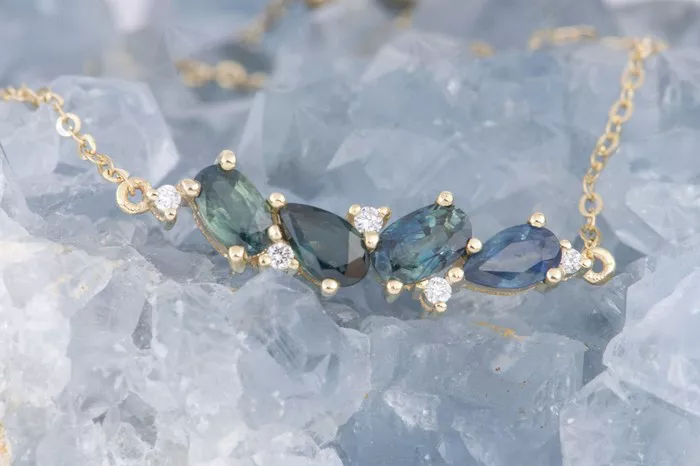Diamonds have long been synonymous with luxury, sophistication, and timeless beauty. A diamond necklace, in particular, stands out as an emblem of elegance, often associated with special occasions, milestones, and significant life events. However, the question arises: can anyone wear a diamond necklace? The answer is multifaceted, involving cultural, financial, and personal dimensions. This article delves into these aspects, affirming that indeed, anyone can wear a diamond necklace, provided they navigate certain considerations and appreciate the broader implications of this cherished gemstone.
Historical and Cultural Context of Diamond Necklaces
Diamonds have been valued for centuries, with their allure dating back to ancient civilizations. The Greeks believed diamonds were splinters of stars fallen to Earth, while Hindus viewed them as divine. Throughout history, diamonds have been symbols of power and status, adorning royalty and the elite. The diamond necklace, in particular, became a hallmark of nobility and wealth.
Modern Perception and Accessibility
Today, the perception of diamond necklaces has evolved. While they still signify luxury, the democratization of jewelry markets and advancements in synthetic diamonds have made these precious adornments more accessible. The contemporary market offers a wide range of options, from high-end, bespoke pieces to affordable yet stunning alternatives, enabling a broader audience to enjoy the splendor of diamond necklaces.
Financial Considerations
One of the primary concerns about wearing a diamond necklace is the financial aspect. Historically, diamonds were out of reach for the average person due to their high cost. However, several factors have mitigated this barrier.
Natural vs. Lab-Grown Diamonds
Lab-grown diamonds have revolutionized the market. These diamonds are chemically and physically identical to natural diamonds but are created in a controlled environment, making them significantly cheaper. This innovation has made diamond necklaces more affordable without compromising on quality or brilliance.
Varied Pricing Options
The jewelry industry offers diamond necklaces at various price points. Factors influencing the cost include carat weight, clarity, color, and cut. Additionally, settings and designs can vary, with simpler styles being more budget-friendly. This range ensures that there is a diamond necklace for almost every budget.
Personal and Lifestyle Considerations
Beyond financial ability, wearing a diamond necklace also involves personal and lifestyle choices. Here are some key considerations:
Occasion and Appropriateness
Diamond necklaces are often associated with formal or special occasions. However, fashion trends have evolved, and it is increasingly common to see diamond jewelry worn in more casual settings. The appropriateness of wearing a diamond necklace depends on the design and the event. For instance, a subtle solitaire pendant can be an everyday accessory, while a lavish diamond choker might be reserved for gala events.
Personal Style and Confidence
Personal style plays a crucial role in deciding whether to wear a diamond necklace. Some individuals feel at ease and confident wearing diamonds regularly, while others might reserve them for special moments. The key is to choose a piece that aligns with one’s style and comfort level.
Gender and Cultural Norms
Traditionally, diamond necklaces were primarily associated with women. However, this norm is changing. Increasingly, men are embracing diamond jewelry, challenging gender stereotypes and expanding the definition of fashion. Cultural attitudes towards diamond jewelry vary globally, but the trend is towards greater inclusivity and acceptance.
Ethical and Environmental Considerations
The diamond industry has faced scrutiny over ethical and environmental concerns. These considerations can influence one’s decision to wear a diamond necklace.
Ethical Sourcing
Conflict diamonds, or “blood diamonds,” have cast a shadow over the diamond industry. These are diamonds mined in war zones and sold to finance armed conflict against governments. The Kimberley Process Certification Scheme (KPCS) was established to prevent the trade in conflict diamonds. Consumers are increasingly demanding transparency and ethical sourcing from jewelers. Reputable brands now provide certification and assurance that their diamonds are conflict-free.
Environmental Impact
Diamond mining has significant environmental impacts, including habitat destruction and resource depletion. Lab-grown diamonds offer an eco-friendly alternative, requiring fewer resources and causing less environmental damage. Choosing lab-grown diamonds can be a responsible choice for environmentally conscious consumers.
Symbolism and Emotional Value
A diamond necklace often carries profound symbolic and emotional value, transcending its monetary worth. It can represent love, commitment, achievement, and personal milestones.
See Also: Can You Wear Citrine as a Necklace?
Gifts and Heirlooms
Diamond necklaces are popular gifts for significant life events such as engagements, weddings, anniversaries, and birthdays. They are also cherished heirlooms, passed down through generations, carrying stories and memories. The emotional value attached to a diamond necklace can make it a treasured possession.
Self-Purchase and Empowerment
In recent years, there has been a rise in self-purchase of diamond jewelry, particularly among women. This trend signifies empowerment and self-expression. Wearing a diamond necklace can be a personal celebration of success, independence, and self-worth.
Fashion Trends and Versatility
The fashion world continuously evolves, and diamond necklaces have remained a staple. Their versatility allows them to be styled in various ways, adapting to different trends and personal preferences.
Layering and Mixing Styles
Layering necklaces is a popular trend, allowing for a mix of diamonds with other materials and designs. This approach can create a unique and personalized look, blending elegance with modern fashion.
Statement Pieces and Minimalism
Diamond necklaces come in diverse designs, from bold statement pieces to minimalist styles. Statement necklaces can be a focal point of an outfit, ideal for formal events, while minimalist designs offer subtle elegance suitable for everyday wear.
Conclusion
In conclusion, anyone can wear a diamond necklace. The key is to find a piece that resonates with personal style, fits within financial means, and aligns with ethical values. The diversity in design, availability of lab-grown diamonds, and changing fashion norms have made diamond necklaces more accessible than ever. Whether as a gift, a family heirloom, or a personal indulgence, a diamond necklace can be a source of joy and a reflection of individuality. Embrace the elegance of diamonds and make them a part of your unique story.

